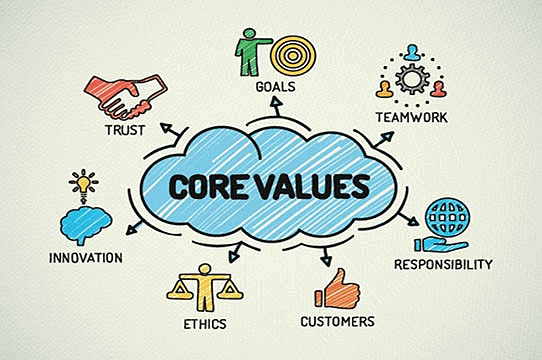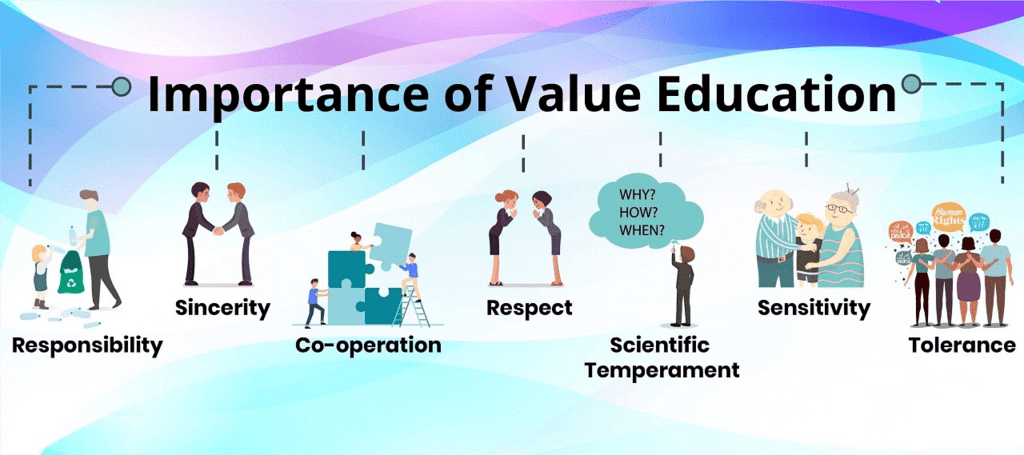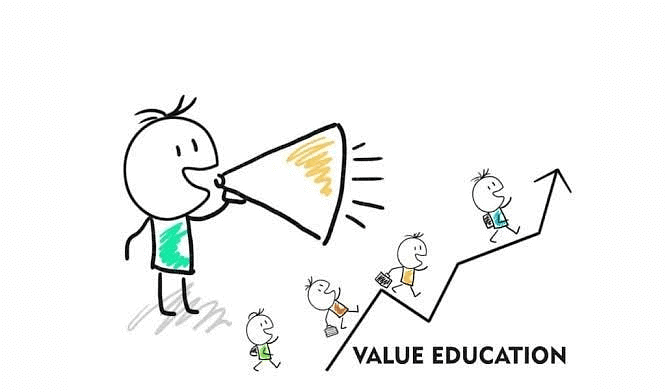Study Value Education & Environmental Education - Higher Education System Notes
| Table of contents |

|
| Value Education |

|
| Need for Imparting Value Education |

|
| Objectives of Value Education |

|
| Categories of Values |

|
| Key Developments in Value Education |

|
Value Education
Value education is the process by which moral values are imparted to individuals.
 According to CV Good, it encompasses all the processes that help a person develop abilities and behaviors aligned with positive societal values.
According to CV Good, it encompasses all the processes that help a person develop abilities and behaviors aligned with positive societal values.- In the words of John Dewey (1966), “Value education means primarily to prize to esteem to appraise, holding it dear and also, the act of passing judgment upon the nature and amount of its value as compared with something else”
Need for Imparting Value Education
- Conflict between Tradition and Modernization: As societies develop, there is often tension between maintaining traditional values and adapting to modern ways of life. Value education helps bridge this gap.

- Globalization: The integration of global economies and cultures has made societies more complex and diverse. Value education promotes understanding and cohesion in such diverse settings.
- Multiculturalism in India: Given India's diverse linguistic, cultural, and religious landscape, value education is crucial for fostering respect and unity among its citizens.
- Inclusivity: A society that values inclusivity ensures that all individuals feel accepted and valued, regardless of their background.
- Environmental Sensitivity: Educating children about the environment encourages them to become responsible stewards of the planet.
- Science and Technology: Promoting value education in these fields encourages ethical practices and responsible innovation.
- Constitutional Values: Emphasizing justice, liberty, equality, and fundamental duties ensures that citizens understand and uphold the principles of the Constitution.
Objectives of Value Education
- Integral Growth: Focuses on the holistic development of individuals, nurturing their physical, mental, emotional, and spiritual well-being.
- Sustainable Lifestyle: Encourages behaviors and attitudes that support long-term ecological balance and conservation of resources.
- National Awareness: Enhances knowledge about national history, cultural heritage, constitutional rights, and fosters a sense of national integration and community development.

- Significance of Values: Raises awareness about the importance of values and their role in personal and societal development.
- Environmental Interaction: Promotes understanding of the interdependence between living and non-living organisms and their environments.
- Religious Tolerance: Encourages respect and understanding of various religious beliefs, fostering peaceful coexistence.
Categories of Values
- Personal Values: Personal values mean the desires of individuals whatever they are in the social relationship. Some of the personal values are excellence, honesty, self-confidence, self-motivation, punctuality, ambition, courage, creativity, imagination, etc.
- Social Values: Individuals cannot live in the world without having interaction with others. People want social values like love, affection, friendship, peer group, reference group, imparity, hospitality, courage, service, justice, freedom, patience, forgiveness, coordination, sympathy, tolerance, etc. Social values are more important for a healthy, good environment for every organization.
- Moral Values: Moral values impart respecting others and ourselves, respecting the right of others, keeping promises avoiding unnecessary problems with others avoiding cheating and dishonesty, showing gratitude to others, and encourage them to work.
- Spiritual values: The ultimate ethical value is called spiritual value. Spiritual values are piety, meditation, yoga, self-discipline, control, purity, and devotion to God, etc. Spiritual values highlight the principles of self-restraint. Self-discipline contentment, reduction of wants, freedom from general greed, and austerity.
- Universal Values: It is universal values that indicate the essence of the human condition. It is through Universal Values that we link ourselves with humanity and the cosmos. Universal Values can be experienced as life, joy, brotherhood, love, compassion, service, bliss, truth and eternity.
- Cultural Values: Cultural values are concerned with right and wrong, good and bad, customs and behaviour. Cultural values are reflected in language, ethics, social hierarchy, aesthetics, education, law, economics, philosophy and social institutions of every kind.

- After classifying values, we must be determining which of the above values are most meaningful. Universal values are at the top of the list. The others have their place but it is through Universal values that we experience a sense of oneness with the human race Universal values must be our foundation if we are to enjoy a rich, profound, fulfilling life.
Key Developments in Value Education
- University Education Commission (1948): Highlighted the need for value-oriented education and suggested reforms, though implementation was limited.
- Sri Prakash Committee (1959): Recommended moral and spiritual education in schools, highlighting the importance of learning about religious leaders.
- National Education Commission (1964-1966): Known as the Kothari Commission, it stressed the importance of direct moral instruction.
- National Policy on Education (NPE) (1986 and 1992): Aimed to use education to promote social and moral values, enhancing unity and integration.
- National Value Education Centre: Set up at IIT Delhi to integrate value education into technological and professional studies.
- Chavan’s Committee’s Report (1999): Revitalized efforts to incorporate value orientation in education.
- National Curriculum Framework (2000, 2005): Committed to fostering values that promote peace, humanity, and tolerance.
Value education is essential for developing well-rounded individuals who can contribute positively to society. By promoting moral values, social responsibility, cultural awareness, and ethical behavior, value education helps create a more harmonious and inclusive world. The key developments in value education in India highlight the ongoing efforts to integrate these values into the educational system, ensuring that future generations are equipped to face the challenges of a rapidly changing world.
|
33 videos|24 docs|6 tests
|
FAQs on Study Value Education & Environmental Education - Higher Education System Notes
| 1. What is the importance of value education and environmental education? |  |
| 2. How do value education and environmental education contribute to overall development? |  |
| 3. What are some examples of value education activities that can be incorporated into the curriculum? |  |
| 4. How can environmental education be integrated into various subjects in the school curriculum? |  |
| 5. How can teachers effectively promote value education and environmental education in the classroom? |  |















